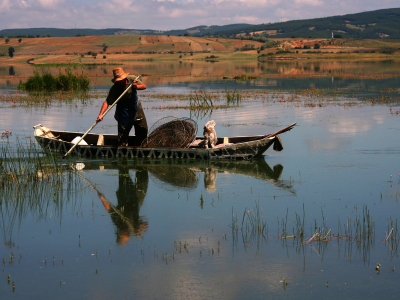
Europe and Central Asia Regional Overview of Food Security and Nutrition 2024
Managing water sustainably for improved food security and nutrition
This report provides the latest updates on hunger, food insecurity and malnutrition in Europe and Central Asia, including the cost and affordability of healthy diets. It also explores the central theme of water security, highlighting its critical connections to agriculture, food security and nutrition. While the region has made progress in reducing hunger and food insecurity (SDG Target 2.1), challenges remain in eliminating all forms of malnutrition (SDG Target 2.2).
Collections
- Country gender assessment series
- Digital agriculture
- Disaster risk reduction and management publication series
- Empowering smallholders and family farms series
- Transboundary animal diseases - Leaflets
Multimedia resources
Publications
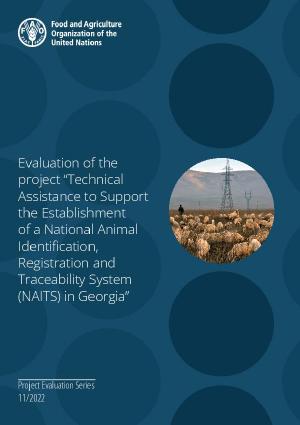
Evaluation of the project “Technical Assistance to Support the Establishment of a National Animal Identification, Registration and Traceability System (NAITS) in Georgia”
11/2022
This report presents the results of the final evaluation of the project “Technical Assistance to Support the Establishment of a National Animal Identification, Registration and Traceability System (NAITS) in Georgia” implemented from 1 December 2016 to 31 December 2021.
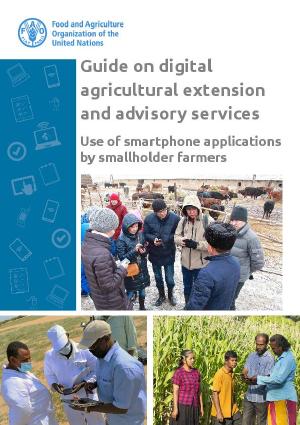
Guide on digital agricultural extension and advisory services
03/2023
Digital agricultural extension and advisory services (AEAS) have a great potential to enhance accessibility, delivery, transparency, scope and impacts of information and services for smallholder farmers. However, this potential is often unfully harnessed and the benefits of digital AEAS unequally distributed due to an evident, widening digital divide between rural and urban areas, gender, and different social groups both within and among regions.
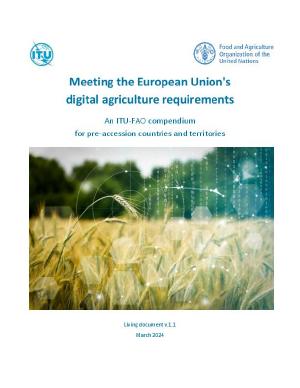
Meeting the European Union's digital agriculture requirements
05/2024
The ITU Office for Europe and the FAO Regional Office for Europe and Central Asia co-authored this document to serve primarily as a compendium supporting the entry of EU pre-accession countries to the EU single market and the alignment of their agricultural policies with the emerging EU legislation related to digital agriculture, and more specifically, the CAP and its delivery.
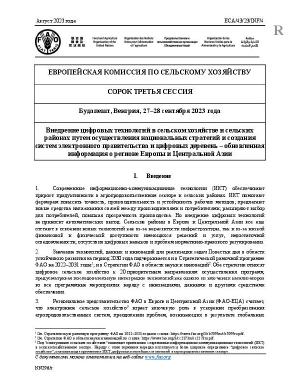
Advancing the digital transformation of agriculture and rural areas through national strategies, e-Government systems, and Digital Villages - update for Europe and Central Asia - ECA/43/23/INF/4
08/2023
In response to the growing demand for seizing the opportunities brought by digital technologies, the FAO Regional Office for Europe and Central Asia has formulated a comprehensive regional action plan to integrate science and innovation and has introduced the Digital REU 2022–2030 approach. It emphasizes affordable and equitable access for rural communities and smallholder farmers, viewing technology as a catalyst for accelerating the sustainable transformation of agrifood systems.
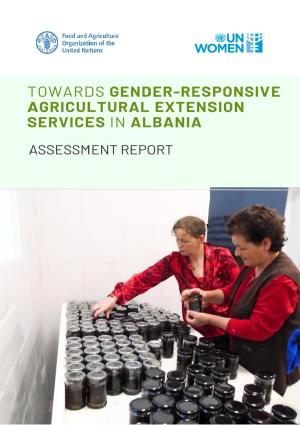
Towards gender-responsive agricultural extension services in Albania: Assessment report
06/2024
This publication assesses the extent, progress and challenges of providing gender-responsive agricultural extension services in Albania based on the FAO Gender and Rural Advisory Services Assessment Tool (GRAST) methodology. This assessment identifies the key gaps at national, organizational and field levels that hinder the achievement of the relevant Sustainable Development Goals (SDGs) and the country’s progress towards inclusive and sustainable agrifood systems.
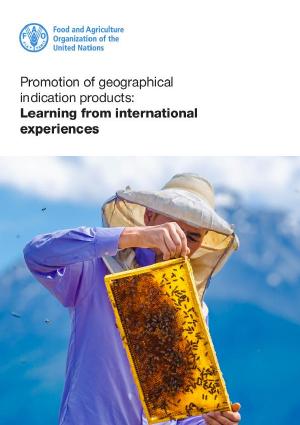
Promotion of geographical indication products: Learning from international experiences
07/2024
This book examines the importance and potential of geographical indication (GI) in Central Asia, drawing insights from global experiences in promoting GI products. It includes successful case studies and provides recommendations for Kyrgyzstan. It illustrates a number of good practices in the promotion of GIs and appellation of origin (AO) products by showing the quality and other positive impacts of geographical indication (GI) value chains.
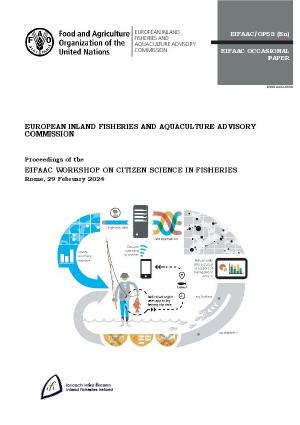
Proceedings of the EIFAAC workshop on citizen science in fisheries
07/2024
The EIFAAC workshop on citizen science in fisheries was held virtually on 29 February 2024. It was organized by the EIFAAC Secretariat and Inland Fisheries Ireland. The workshop was attendedby 79 participants from 21 countries. Five invited speakers presented their citizen science research findings and recommendations.
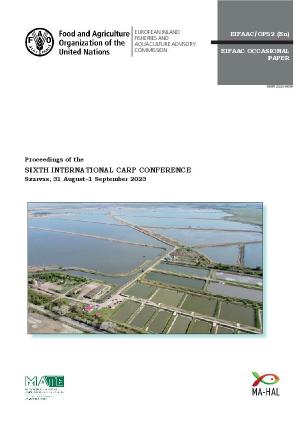
Proceedings of the Sixth International Carp Conference
07/2024
The Sixth International Carp Conference was organized in Szarvas, Hungary, on 31 August–1 September 2023. The conference aimed to strengthen the “carp segment” within European aquaculture, improve the image of carp pond aquaculture as common European heritage, and to explore the opportunities for carp within “blue aquaculture”. The Sixth International Carp Conference approved the “Szarvas Declaration”.
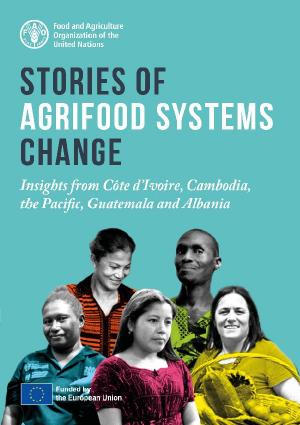
Stories of agrifood systems change
07/2024
A series of country change stories has been documented in an attempt to ground the global agrifood systems discourse in specific realities and make sense of what they mean at country level. The five stories in this publication illustrate the varied ways in which FAO accompanied governments, civil society organizations and other development partners on a journey of agrifood systems transformation in Côte d’Ivoire, Cambodia, the Pacific, Guatemala and Albania.
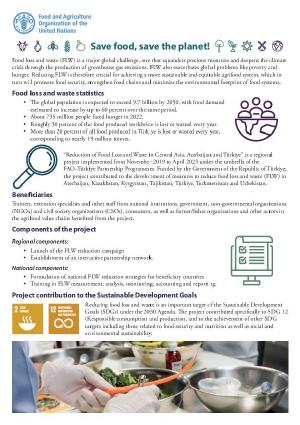
Save food, save the planet!
06/2024
Food loss and waste (FLW) is a major global challenge, one that squanders precious resources and deepens the climate crisis through the production of greenhouse gas emissions. FLW also exacerbates global problems like poverty and hunger. Reducing FLW is therefore crucial for achieving a more sustainable and equitable agrifood system, which in turn will promote food security, strengthen food chains and minimize the environmental footprint of food systems.
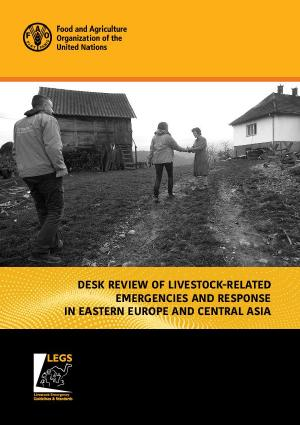
Desk review of livestock-related emergencies and response in Eastern Europe and Central Asia
06/2024
This review covers three types of emergency: slow onset (such as drought); rapid onset (flooding, earthquakes, hurricanes, volcanic eruptions, tsunamis; and complex (mostly war or conflict-related). It considers natural disasters and protracted crises only and covers all of these categories of emergencies within Eastern Europe and Central Asia over the past 25 years, based on a set of crises prioritized by the FAO regional team (see Annex A for the list of countries and emergencies).
.jpg?sfvrsn=5f9ef71f_1)
Kosovo gender profile for agriculture and rural livelihoods
06/2024
The Kosovo gender profile for agriculture and rural livelihoods aims to improve knowledge on gender‑related issues in agriculture. It proposes evidence‑based recommendations for advancing gender equality.
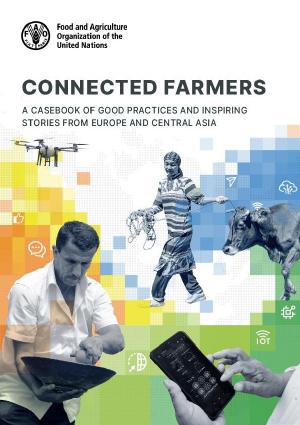
Connected farmers: A casebook of good practices and inspiring stories from Europe and Central Asia
05/2024
This casebook unfolds the stories of 25 farmers and agripreneurs who have successfully embraced digital technologies. The accounts presented here reveal that, opportunities for innovation and resilience can be found. The case studies presented here, grouped into five distinct use cases, illustrate the transformative power of digitalization in agriculture, and serve as tangible examples of the successes and lessons learned on the path to sustainable development.
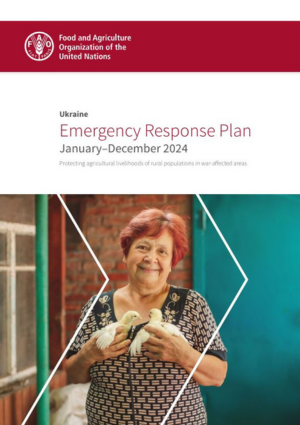
Ukraine: Emergency Response Plan, January–December 2024
05/2024
The war in Ukraine continues to compound the vulnerabilities of rural communities, especially those living near the frontline. Rural communities are increasingly becoming food aid beneficiaries and nearly one‑third of planned food aid beneficiaries under the 2024 Humanitarian Response Plan are rural people who traditionally produce their own food. In this context, the Food and Agriculture Organization of the United Nations (FAO) has developed the 2024 Emergency Response Plan (ERP).
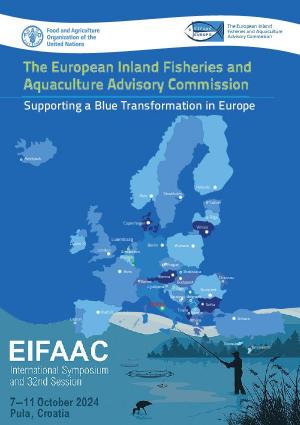
The European Inland Fisheries and Aquaculture Advisory Commission – Supporting a Blue Transformation in Europe 2024
05/2024
This 2024 document of the European Inland Fisheries and Aquaculture Advisory Commission (EIFAAC) describes progress made by EIFAAC in 2023 and 2024 towards implementing its workplan and showcases news from EIFAAC Members, such as new policies, new legislation, new studies, and innovations in aquaculture and inland fisheries production and management.
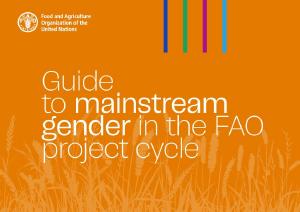
Guide to mainstream gender in the FAO project cycle
04/2024
This is an updated version of the 2017 Guide to mainstreaming gender in the FAO project cycle. It provides project formulators with practical guidance and tools to implement the gender related requirements established in the different phases of the FAO project cycle, and to support the formulation of projects and programs that contribute to advancing gender equality and women’s empowerment in agrifood systems, as foreseen by FAO’s mandate.
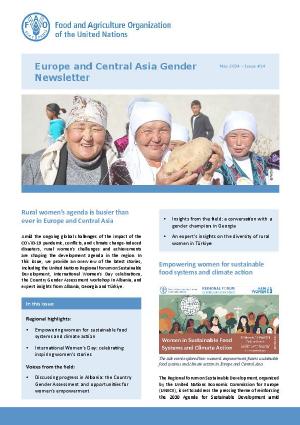
Europe and Central Asia gender newsletter, May 2024 – Issue #14
05/2024
In this issue of the FAO Europe and Central Asia Gender Newsletter, we provide an overview of the latest stories, including the United Nations Regional Forum on Sustainable Development, International Women’s Day celebrations, the Country Gender Assessment workshop in Albania, and expert insights from Albania, Georgia and Türkiye.
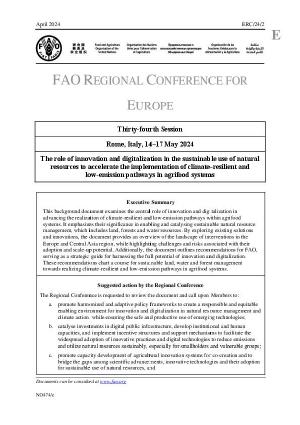
The role of innovation and digitalization in the sustainable use of natural resources to accelerate the implementation of climate-resilient and low-emission pathways in agrifood systems - ERC 24/2
05/2024
This background document examines the central role of innovation and digitalization in advancing the realization of climate-resilient and low-emission pathways within agrifood systems. It emphasizes their significance in enabling and catalysing sustainable natural resource management, it outlines recommendations for FAO, serving as a strategic guide for harnessing the full potential of innovation and digitalization.
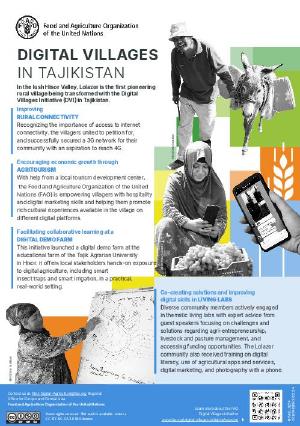
Digital Villages in Tajikistan
05/2024
The flyer details the activities that are ongoing as part of the digital Villages initiative in Tajikistan. Digital Villages enhance rural resilience and food security by providing farmers with digital tools for accessing inputs, market information, and alternative sales channels online.
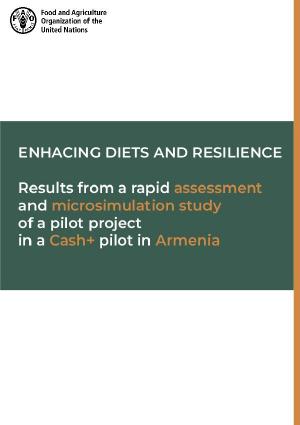
Enhancing diets and resilience
04/2024
This report presents the results of a mixed-method rapid assessment that provides both indicative quantitative information and in-depth qualitative analysis on the household-level impacts of the Cash+ pilot. The aim of this study is to evaluate the impacts of the pilot on beneficiaries, in particular on their diets, agricultural activities, income generation and poverty reduction and its potential for poverty reduction through a scale up of similar support.
